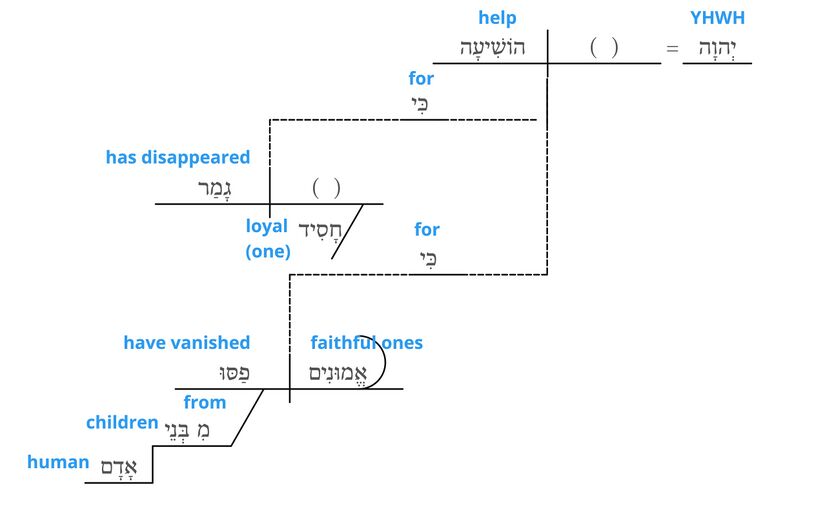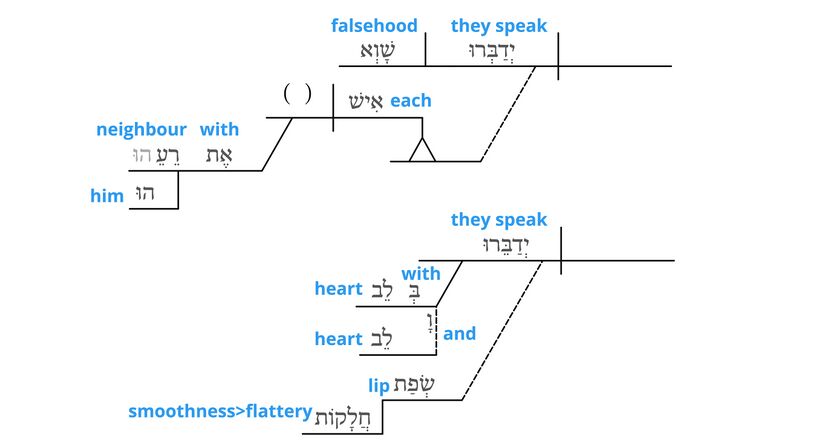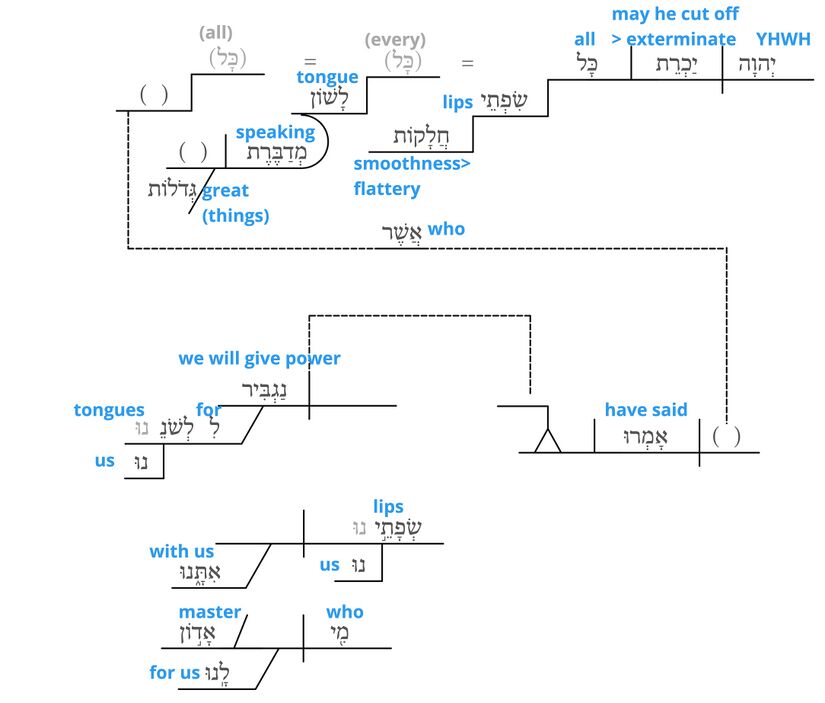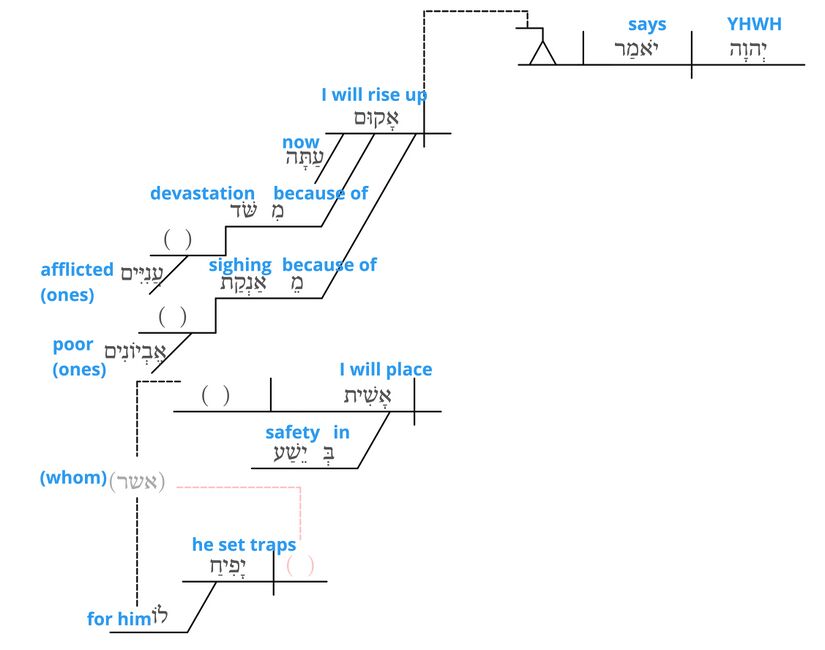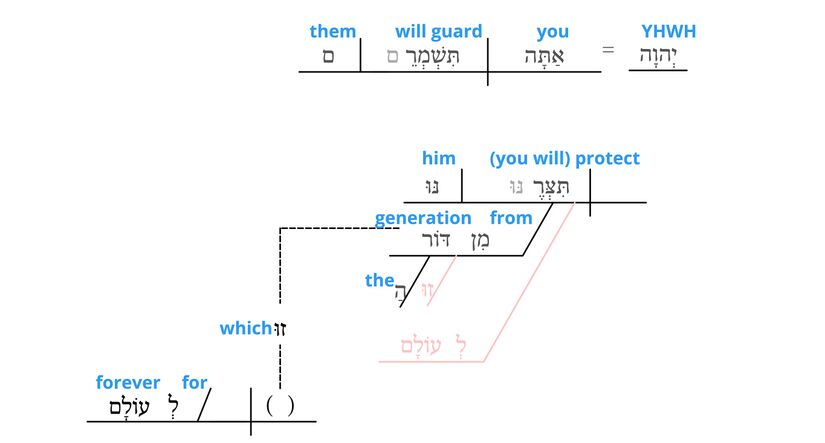Psalm 12 Grammar
From Psalms: Layer by Layer
Grammatical Diagram
The grammar layer visually represents the grammar and syntax of each clause. It also displays alternative interpretations of the grammar. (For more information, click "Grammar Legend" below.)
v. 1
v. 2
v. 3
v. 4-5
v. 6
- Who is doing the "puffing" in v. 6, and what/whom are they puffing for/against? There are three main options.
- The wicked puff against the poor (e.g., KJV: "I will set him in safety from him that puffeth at him"; cf. ELB, NGÜ, EÜ, ZÜR).[1] According to this interpretation, יפיח לו is an asyndetic relative clause functioning as the object of the verb אשית, and the pronoun לו is a resumptive pronoun. This interpretation is preferred in our diagram, since (1) a pronoun at the end of a relative clause is frequently a resumptive pronoun, and since (2) the verb יפיח has a similar meaning in Ps. 10:5 (although, in that case, the verb is followed by a beth prepositional phrase): "[the wicked person] sneers at all of his enemies."
- The poor puff for (=desire) salvation (ישע). Most English translations follow this view (e.g., NEB, NLT, ESV, NET, NRSV, GNT; cf. LUT, HFA, RVR95, DHH).[2] "It is not to be explained: him whom he, i.e., the boaster, blows upon, which would be expressed by יפיח בּו , cf. Ps. 10:5; but, with Ewald, Hengstenberg, Olshausen, and Böttcher, according to Hab. 2:3, where הפיח ל occurs in the sense of panting after an object: him who longs for it."[3] This interpretation, like the previous one, treats יפיח לו as an asyndetic relative clause functioning as the object of אשית. Unlike the previous interpretation, it does not interpret לו as a resumptive pronoun.
- More recently, others have argued that יפיח is a substantive meaning "witness" (see Prov. 6:19; 12:17; 14:5, 25; 19:5, 9; cf. Ps. 27:12).[4] Miller thus translates the verse, "I will place in protection the witness in his behalf."
v. 7
v. 8
- Virtually all translations and most commentators understand זו as a demonstrative modifying הדור ("this generation") (LXX, Jerome, Tg.; NIV, ESV, NLT, NET, NEB, REB, CEV, JPS85, NJB; LUT, HFA, NGU, ELB, EU, GNB, ZUR).[5] Despite the rather strong consensus surrounding this interpretation, the following considerations support reading זו as a relative particle ("the generation which is forever" = "the everlasting generation").[6]
- זו functions as a relative particle in every other instance (Ex. 15:13, 16; Isa. 42:24; 43:21; Hab. 1:11[?]; Pss. 9:16; 10:2; 17:9; 32:8; 62:12; 68:29; 142:4; 143:8). By contrast, there is no clear example of זו functioning as a demonstrative pronoun.
- הדור has the definite article. If זו were to modify הדור, then it would probably have the definite article (הדור הזו). It probably functions, therefore, according to its normal use as a relative particle.
- According to the Masoretes (Masorah and accents) the זו in Ps. 12:6 is a relative particle.
v. 9
Full Diagram (vv. 1-9)
References
- ↑ Cf. Hitzig; Kraus 1988:207; Zenger 1993:94-95
- ↑ So also BDB, DCH.
- ↑ Delitzsch.
- ↑ See Dennis Pardee; "YPH 'Witness' in Hebrew and Ugaritic," Vetus Testamentum IOSOT, 2013 (99-108); Patrick D. Miller, “Yāpîaḥ in Psalm XII 6,” Vetus Testamentum 29 (1979): 495–501.
- ↑ So GKC §126y; BDB; HALOT.
- ↑ IBHS §19.5d; DCH; Goldingay 2006.





















